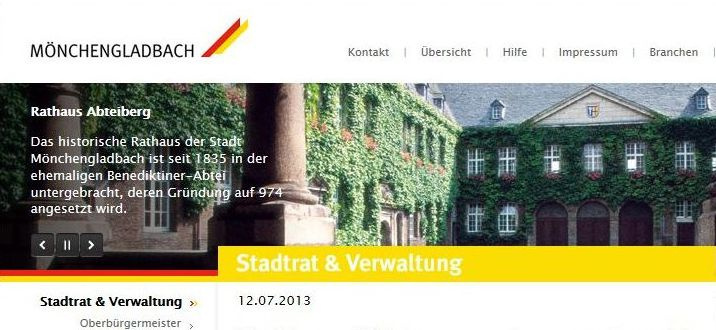| An article from the website of Moenchengladbach describing the events that took place at JHQ in July 2013 to celebrate the closure of the Garrison. See below for English translation of the article!
|
   
|
| They came as soldiers – and leave as friends”
An era comes to an end for Moenchengladbach. The British bade farewell to the Mayor, Norbert Bude, and the people of Moenchengladbach with a military parade on Kapuzinerplatz and high ranking military officers signed the “Goldene Buch der Stadt”. Almost 60 years after it was opened the Headquarters in Rheindahlen finally closed its gates. The British are saying “Goodbye” and returning to their homeland. After the three day closing ceremony began with a reception yesterday, it continued today with a military parade on Kapuzinerplatz in front of many spectators. “Today we are creating town history. We are closing a big, and for the town, very important, chapter and creating a festive, official closing milestone. With the departure of the British a era comes to an end. An era that began, almost to the week, on the 1st July 1953 when the cornerstone was laid for the “Big House” said the Mayor, Norbert Bude in his speech, that was listened to by such high ranking representatives as Air Chief Marshall Sir Stuart Peach, Major General John Henderson and Brigadier James Richardson, who all, at the end of the parade, signed the “Goldene Buch der Stadt”. “One must remember that at that time, just a few years after the Second World War, the British were an occupying power. The lasting friendship that evolved would not have been dreamt about by the legendary Field Marshall Bernard Montgomery, the first Chief of the British Army of the Rhine, and General Sir Richard Gale, the first British Commander for Moenchengladbach.” added Mayor Norbert Bude, who together with the other guests and spectators looked back to 1953 when the cornerstone was laid by high ranking British Army, Royal Navy and Royal Air Force officers to the sound of the nation anthems of Great Britain, Belgium, the Netherlands, Canada and Germany. On the cornerstone was inscribed the word “jointly”, meaning together. The new Headquarters was to take on the control function for the Army, Royal Navy and Royal Air Force in the British Occupation Zone that was previously undertaken from the towns of Bad Oeynhausen, Bad Eilsen and Benkhausen. Due to the changing military situation in 1953 a decision was taken, a year earlier, to build a new joint headquarters in Moenchengladbach. The military had ambitious plans to develop almost 470 hectares of woodland in Rheindahlen into an independent part of the town with its own infrastructure. Almost 1,000 companies participated in the building of JHQ with up to 6,000 builders and construction workers employed. Approximately 200 million D-Mark were invested in the construction of an excellent infrastructure, more than 2,000 buildings, a shopping center, several sports facilities, schools, kindergardens and workshops. A power station, water works and extensive underground technical infrastructure were added which made the headquarters into a completely independent “Town within a town”. Within only a few weeks of the facilities becoming available almost 12,000 British people moved into the headquarters. They were joined later by numerous other NATO partners. It is noted in the town archives that the soldiers were greeted by the Mayor of that time, Dr. Wilhelm Finger, and the Senior Town Director, Dr. Wilhelm Fleuster, with the words “We hope that you will soon settle in and feel at home in our town, that a good relationship will soon establish itself on a cultural, sporting and, above all, personal level, and that this important date will be the start of a happy and peaceful period”. Now, 60 years later, this period of successful and lasting cooperation comes to an end. Mayor Norbert Bude continued with “The headquarters was for me always a “piece of Internationality”. It is, and should remain, an example of the friendly relationship with the forces stationed here and the citizens. In the course of time we have grown together. The acceptance of each other by military and civilians has led to a development of mutual respect for one another. The openness, with which we greeted one another, came from both sides. I thank you for that”. Moenchengladbach welcomed, with their hearts, the people who worked and lived in the headquarters, the soldiers, male and female, and their families. “We have, together, walked a considerable distance. That connects us. We have experienced the end of the Cold War and the Unification of Germany. During this time together we have developed partnerships and friendships. Once came soldiers, to secure peace in Europe. Now friends are leaving us” highlighted Mayor Norbert Bude, who thanked all those responsible for the good cooperation, the open communication and the friendly meetings. “I, personally, will miss that piece of British culture and living. I have always valued the meetings and ceremonies. I was able to experience that “typical British way” during parades, receptions, celebrations and memorials were, for me, enriching. The participation by our British friends in our events is amazing. Many thanks for that”. The closing program continues with: On Saturday, 13th July 2013, the British are inviting all to a “party in the park” in the Joint Headquarters (JHQ). From 13:00 to 22:00 there will be a Volksfest with music, shows and demonstrations of equipment. The party will close with a big Firework display. The entry to JHQ will be through the Hardter Strasse entrance. The celebrations will end on Sunday, 14’th July 2013, with a German-British Religious Service in the Saint Boniface Church, during which the Mayor, Norbert Bude, and a representative of the British Army will read sermons. (pmg/sp) Translation by Fred Williams |



